If you’ve been watching movies going back to the ’90s, you’re probably familiar with David Koepp’s writing from blockbusters like Steven Spielberg’s Jurassic Park, its sequel The Lost World, the first Mission: Impossible or even the first Spider-Man movie in 2002.
Every few years when he’s not one of Hollywood’s most in-demand writers, David Koepp would direct a movie or two, and though the movies have ranged in tone and genre, he’s probably had the most success with thrillers, whether it’s 1999’s Stir of Echoes or 2004’s Secret Window, starring Johnny Depp and based on a Stephen King story.

Now, Koepp has reunited with Kevin Bacon, the star of Stir of Echoes, for the high-concept psychological thriller You Should Have Left (rent at Amazon today), produced by Blumhouse. Bacon plays Theo Conroy, a man trying to escape his dark past when he moves into a house in Wales with his younger actress wife Susanna (Amanda Seyfried) and their daughter Ella (Avery Essex). Theo begins to have bizarre dreams, and other weird things start happening as he soon learns that there’s more to the house than what seems, with secret rooms and hallways that don’t make sense with the general layout of the house.
Vital Thrills spoke with Koepp earlier in the week, and we also spoke a little about Koepp’s fairly recent work within Universal’s “Dark Universe” as a co-writer on The Mummy and having written a Bride of Frankenstein remake that may be taken under Jason Blum’s wing in a different incarnation than the originally-planned Bill Condon movie.
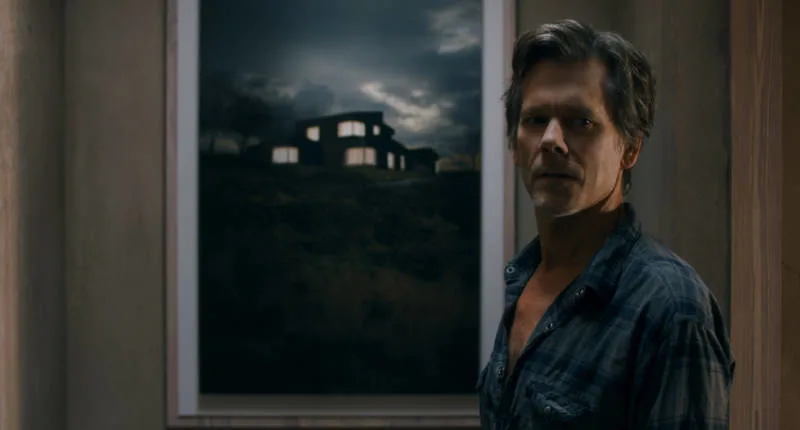
Vital Thrills: I just rewatched “Stir of Echoes” since I hadn’t seen it in maybe 15 years. I was surprised to see so many parallel themes between it and “You Should Have Left.” Was that a coincidence, or was it something you discussed with Kevin before deciding on doing this as a follow-up?
David Koepp: No, it’s called who you are. What can I say? I like a creepy house, and I like the idea that there are levels to your house you don’t know about, and there are levels to yourself you don’t know about. I just feel like I’ve been telling various versions of that story for a long time, and I keep finding new fertile terrain. Certainly, Kevin and I were aware that there were some similarities, but we both love that movie and had a good time doing it, so we’re okay with it.
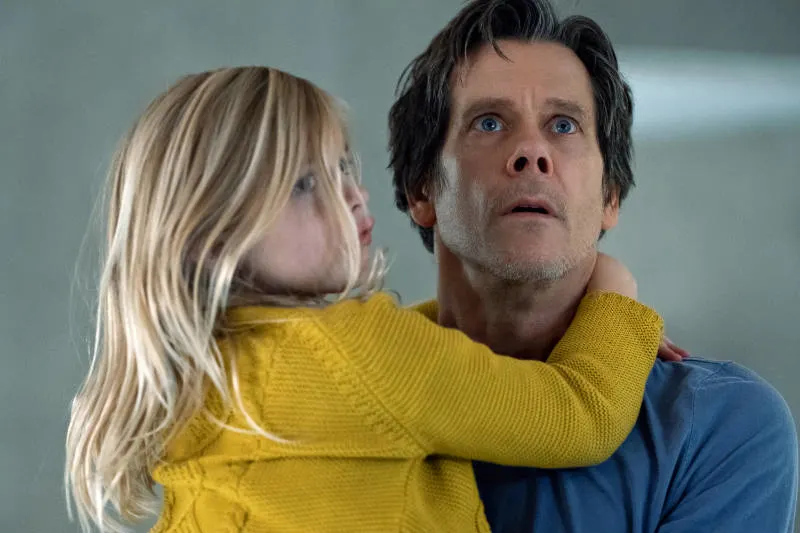
VT: I assumed “You Should Have Left” was an original idea, and I didn’t know it was based on a novel, nor was I familiar with Daniel Kehlmann vs. Richard Matheson or Stephen King, who you previously adapted. How did you find that material and put this together with Jason Blum?
David Koepp: Kevin and I started talking, and he said, “Hey, let’s do a scary movie, but what if it’s set in a marriage?” and I said, “Great, cool.” We started exploring some ideas that were interesting to us in that regard, and the idea that the great horror Renaissance of the last ten years or so has liberated a lot. The kind of movies Jason’s making is really catnip for actors and filmmakers because as long as you stay within certain budget limits, you’re free to tell any kind of story you want. Make it scary and don’t spend too much money, and you can sneak in a marital drama, a race relations drama, or any kind of social or character commentary you want to make.
Around the time we were talking about it and kicking around ideas, Daniel Kelhmann’s book came out – I wasn’t very familiar with the writer’s work myself. Kevin read a review of the book and said, “This has a lot of our story in it. You should check it out.” So I did, and it was wonderful because it was some of our ideas were reflected in the story and a whole bunch of new ones, so we optioned the book and took it from there.
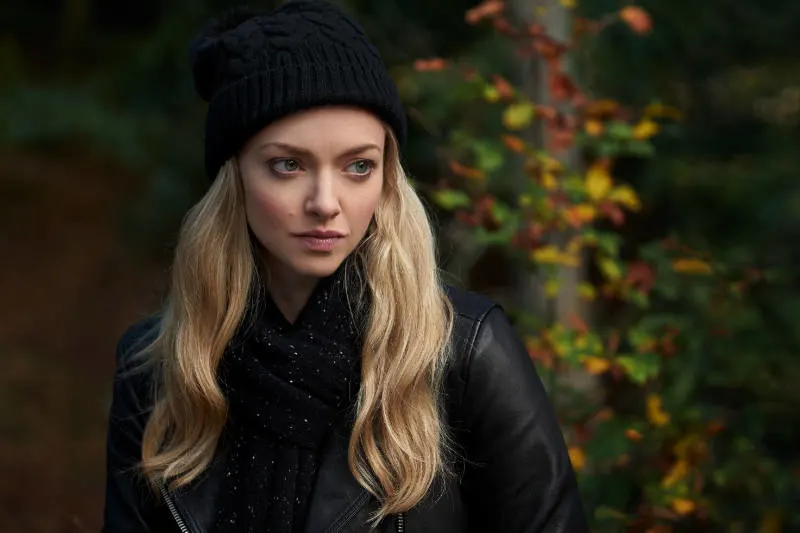
VT: It also has a few familiar things from other movies Jason has made with a small cast, mostly taking place in one location, so did you bring it to Jason after you and Kevin had already put together a package and had adapted it?
David Koepp: So then we got hold of the book and secured the rights, and I wrote a script, and then we sent it out. I was hoping that Jason would go for it because I admire his films very much, and I knew that he had a very particular philosophy on how to do them. I wanted to learn that. I wanted to learn another way of making movies, so I was very happy that he responded to it. I thought that was exciting. Then, as we talked about it more and got going, I did make the mistake of thinking, well, because this is a smaller budget, it’s one location, and it has a controllable number of actors, it will be easier. It was not.
All the logistics were fine. The budget was fine, but storytelling kicks your ass every single time because it’s really hard to do a good one. I think it was my 30th movie, and still, I am humbled before the gods of storytelling. What makes a good story when you’re… What else do you need to keep doing your story to make it work? It was a learning experience the whole way because every single one of them is hard.
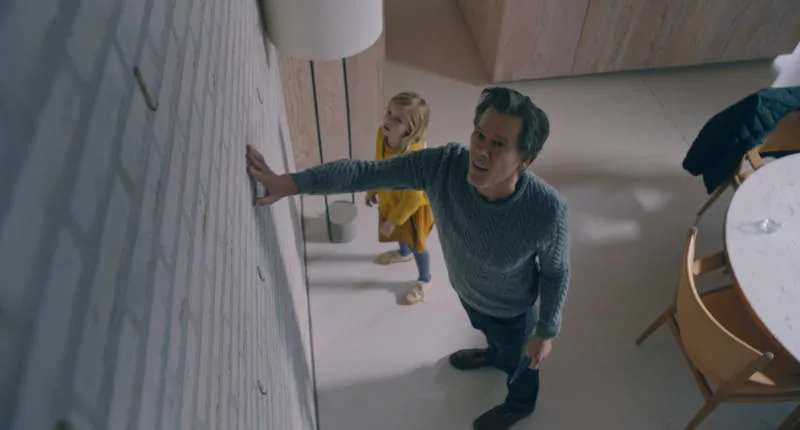
VT: One thing about this house, and I’m trying to avoid spoilers here, but there are a lot of different levels sand areas, so did you end up having to build most of the interiors on a soundstage to make that work?
David Koepp: It was some of both. Part of the central idea of the story is that this house, which appears very simple and straightforward, is actually quite complex both geographically and geometrically, and I wanted the feeling of the second part of the movie to be like the feeling you get when you’re traveling, and you’re staying in somebody else’s house or hotel, and you wake up in the night to go to the bathroom and in the dark and the door isn’t where you thought it was and you’re feeling along a wall. For a second, you can’t remember where you are… Why? What the hell is going on? That’s how I wanted to feel for 45 minutes. So we found this house that you see in the movie, the “Lighthouse.” Our production designer came in with that when I first met her, and I said, “Oh, yeah, I want to shoot there. That’s where we’re going to shoot.”
And we added a second story. The real house only has one floor, but after that, we shot some interior and then built our set, and we had some leeway because part of the story point is that the house is different on the inside than it ought to be given what its outside is. So we had some flexibility, but we couldn’t make it so different that it made no sense, and they should have run screaming out of it the first time they went in. So then balancing what the hallways that are there in the real location and what the hallways we’re building and adding and changing all that was a bit of a spreadsheet nightmare.
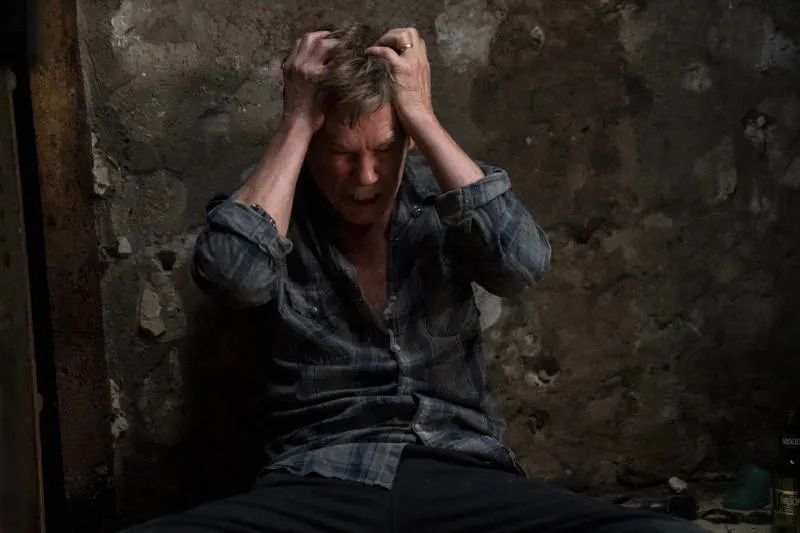
VT: Another thing in common with “Stir of Echoes” is it also features another young actor and Avery is absolutely amazing as Kevin’s daughter. I was constantly blown away by her decisions as a first-time actor despite being a child. How do you work with her to get those emotions?
David Koepp: I’m glad that you felt that because that’s how we felt on the set. She is just a natural, and I’ve seen it a few times in kids. Dakota Fanning, Joseph Mazzello in “Jurassic Park,” who are just so natural, and just have such an uncomplicated relationship with the camera. Our casting director, Terry Taylor, found her. She looked at a hundred kids and Avery had never done a movie before. She’d done a couple of commercials, I think, maybe one or two episodic TV things, and it was wild because she’d be just the most normal six-year-old kid in the world, bouncing off of stuff and talking and yelling and running around the set. And then you say “action,” and she would just snap into character in a way that you couldn’t quite believe how locked in she was. She’s got a real gift. I don’t know if she and her family wanted to make a career or not for her, but if they do, she can have it, because she’s really great.
VT: This one was pretty quick. I knew you were making a movie with Kevin Bacon, but I didn’t know anything about it or see a trailer until recently. Did you have it in the can, and you were just waiting for them to figure out scheduling and all that stuff?
David Koepp: We just finished in maybe February, March, and we were talking about, “Okay, how are we going to release it? What’s our date? What does the calendar look like?” And all those conversations were in progress when COVID hit, and I quickly felt, within a few weeks I started saying… Jason and I both had the same thought at the same time, which was we have a movie about people trapped in a house and the entire world is trapped in their house. And all these gigantic movies are getting kicked down the road and there’s going to be such a free for all for release dates – there already is. I just don’t know how and where we would ever fit in, so this seemed like a really perfect way for our movie to come out.
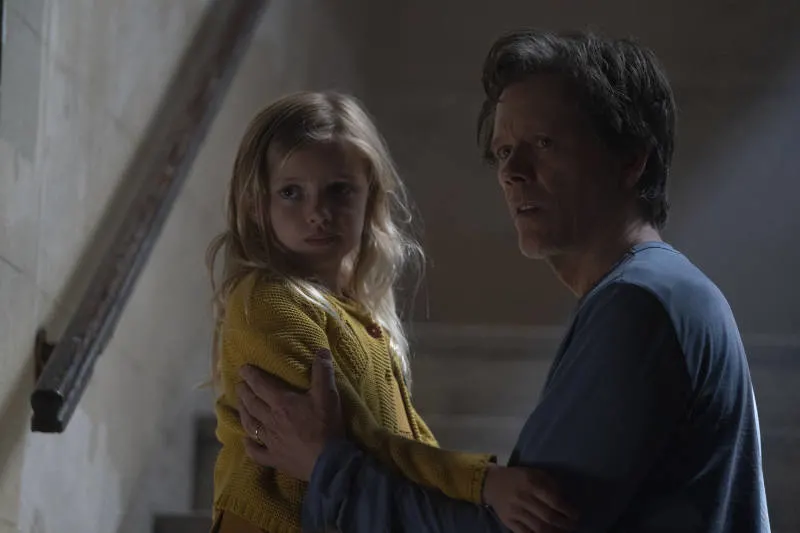
VT: Are you trying to do some kind of virtual premiere for her? That really has to be exciting for an actor making her first movie.
David Koepp: I’m afraid not on this. It’s too hard to figure out. I think we miss a lot. I’m grateful that we have this release because in this time when nobody can go to movies, I find it really exciting on Friday night or our case Thursday when a new movie comes out, and you can see a new movie the day it comes out. It’s the movie you were reading about a little bit online, and I think that’s cool in its own way.
VT: That definitely makes sense. I know how hard studios work to try to find the perfect release date, and all of that was just thrown out the window almost immediately.
David Koepp: They’re all just piling up. All these gigantic movies that would kick our ass.
VT: It was funny rewatching “Stir of Echoes,” in which you have all these parties and a huge block party, and it’s really weird watching that now since it’s so different from the world we live in.
David Koepp: Oh, it’s weird. You watch a movie now and characters shake hands and everybody in the room shouts, “Oh no. That’s gross! What are you doing?”
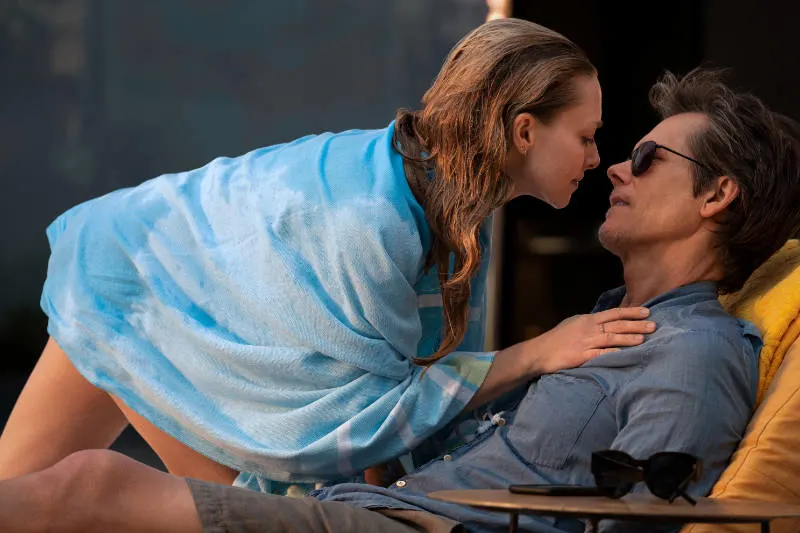
VT: I also wanted to ask about the KT Tunstall cover of the Clash at the end. Was that something she had done already that you just found and used? Or did she record it, especially for the movie?
David Koepp: Isn’t that a beautiful song? That was just something we just found in post looking around at what might be the appropriate music. And it’s a beautiful cover and it has such a nice build of dread at the beginning of it, which seemed to suit our movie.
VT: I also liked the way the movie looked. I’ve been watching many movies on my computer, and it really looked noticeably better than most others I’ve seen. Was this a DP you had worked with before?
David Koepp: No, Angus Hudson, who’s a British DP. I was living in London for about four years with my family until recently, fairly recently. And so that was part of the reason I wanted to set it in Wales because I was fascinated by the English countryside and Welsh countryside. And so it was all, pretty much an all British crew and Angus is somebody I met there and I really admired his outdoor photography. He shoots nature beautifully, both in stills and in his films. And we met and hit it off right away. But it’s got a great look and I think it also works very nicely with the production design, which is this deceptively bland interior that becomes more and more creepy and weird and reveals other other aspects to itself.
But that house dictated a lot, because it has a very nice inside-outside flow, so it blends with its environment but stands completely at odds with it at the same time. I remember when I first went up to see it, I drove to Wales, and I was staying in a pub in the village and they said, “So what are you here for?” I said, “I’m making a movie. We’re looking for a house for it.” They said, “You going to see that awful thing on the hill?” I said, “As a matter of fact, I am. I don’t think it’s awful. It’s really cool.” And they said, “People rent it, nobody stays in it more than two nights.” And I was like, “Really? That’s the house I’m looking for.”
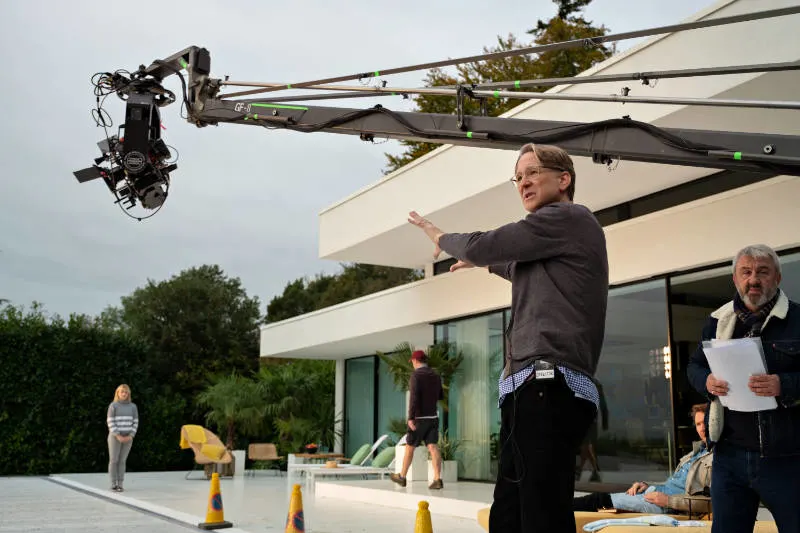
VT: I also liked the aspect of old horror movies where you have the townspeople distrusting people from outside the town, going, “Who are you? What are you doing here?” I know you worked on “The Mummy” for Universal’s Dark Universe, but now Jason has been given the keys to that realm with “The Invisible Man.” Have you stayed on “Bride of Frankenstein” to bring it into what Jason was planning, or is that on the backburner now?
David Koepp: I worked for four or five weeks on “The Mummy,” but I was talking to Universal throughout about this “Dark Universe” thing. It was funny, because – it wasn’t funny at the time, because things went badly. Things went so bad. What I was impressed by was that Universal stopped everything. We were working on a “Bride of Frankenstein” at the time, which I do think would have been a terrific movie. Bill Condon was doing it, but Universal stopped everything and said, “This is not working. We want to think about it for a year or two.” And you don’t see that at a lot in corporations.
They’re usually in such a headlong rush to keep going, keep going, keep going, but then they stopped and said, “Okay, we want individual takes from filmmakers. We don’t want anything that interconnects. We want to bring the budget down, which will have the curious effect of liberating you actually to do any kind of story you want.” So I said, “Okay, I have another idea for ‘Bride of Frankenstein.’ Can I try a different approach?” And they said, “Okay, fine. But this is your last try.”
VT: It’s good you got another chance!
David Koepp: Yeah, so I wrote it. I gave it to them about a month ago, and they really like it, so we’re talking to directors, and we’ll see what happens.
VT: Have you thought about directing it yourself? You’ve written a lot of bigger blockbusters for other directors but don’t often direct those bigger movies yourself. Since you’ve been directing quite a bit more, maybe that’s a bigger movie you might be able to direct?
David Koepp: No, I have a very mixed and unhappy relationship with directing. I hate it every single time I do it, and then a couple of years go by and I say, “Well, this is one I have to direct. I got to do this one.” Currently, I’m in the, “I’m never doing that again,” phase, which I know will fade in about 18 months, and I’ll do something else, but that one doesn’t seem right. I can usually tell when I’m working on it, if it’s something I should write and direct or just write. I’ve been really lucky to work with some great directors and I love writing for other directors, and I love the freedom of being able to write something really complicated, hard to figure out, and unpleasant to shoot [when] it’s not my problem.